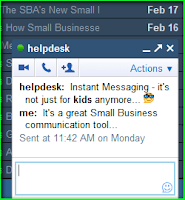Instant Messaging
If you’re like most Small Business owners or operators “of a certain age”, your view of Instant Messaging, if you have one, may be similar to one of the following statements:

- Instant Messaging is for kids
- I have an email account – what do I need messaging for?
- It’s too complicated
- I don’t have time for that nonsense
- What good could this messaging stuff do for my Small Business?
I’m sure most of you reading this can relate to at least one of the statements above; the last one asks the question which is, in fact, the topic of today’s post.
Business, as I’ve mentioned in the previous series, is about relationships. Relationships, in turn, are about communication. I’m sure it’s no secret that email is an essential Small Business tool — if nothing else, it has allowed Small Businesses to save on postage and shipping costs once required to provide instant communication. Where it once took a special delivery or overnight package delivery (and still took at least a day) to ship critical documents to a business partner, vendor or client, we can now attach a PDF or word processor file to an email, and the relevant party receives it almost instantly.
Thus the “instant” in instant messaging — “IM“, as it is commonly known, combines the quickness of a phone conversation with the permanence of text. This second component is not to be overlooked, or taken lightly. How many times have you spoken with someone about a previous conversation, struggling to recall an important detail that neither of you can remember now, because you weren’t recording the call or taking notes?
IM-ing is nothing but taking notes, real-time, as you engage in conversation. Even with a stenographer on hand, you would still probably miss much, and usually only capture your side of the call. With IM, the transcription IS the conversation and, in addition, you have the benefit of:
- Including links to relevant websites
- Transferring electronic documents and digital images
- Copy-and-pasting information from emails and existing documents
- Creating a “paper trail” for reference and auditing purposes
In addition to these benefits, IM helps reduce the occurrence of “foot-in-mouth disease“: since you type your responses before you transmit them, you have a few seconds before you click “Send” to decide if you want to forward what may amount to an emotional outburst, rather than a well-chosen response.
Google and Yahoo! have standalone chat clients and clients built into their emails; Facebook and MySpace accounts have built-in chat as well. Blackberry, Android and iPhone smartphones all have apps that aggregate all your chat clients into a single location, allowing you to appear online to all your various chat partners.
In addition, there are stand-alone chat tools such as Meebo, Citron and ICQ that do the same thing from your desktop. Being able to communicate with your Small Business clients, partners and vendors as quickly as a phone call, with the permanence of text, the ability to embed web links and transfer files may be a novel concept to you, but you must certainly appreciate the possibilities it presents.
Consider it from the perspective of business objectives, not just technology. The strategic business advantages should be quite obvious — if you’re getting the message.
Related articles








